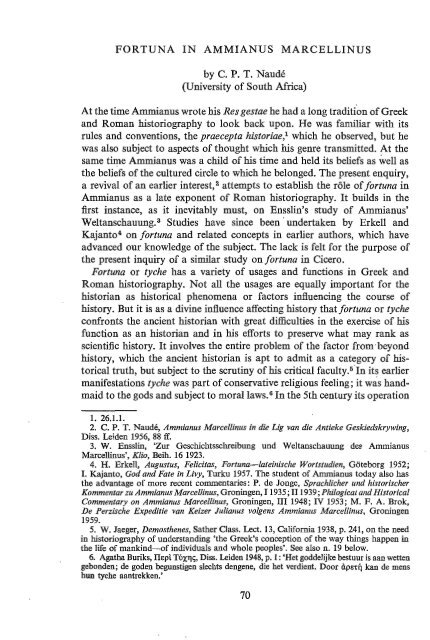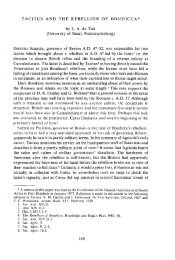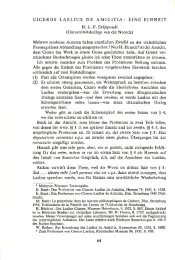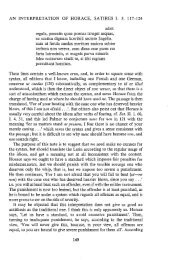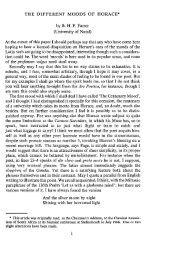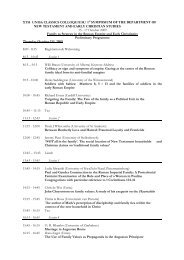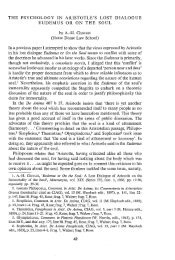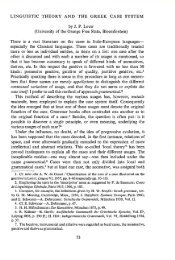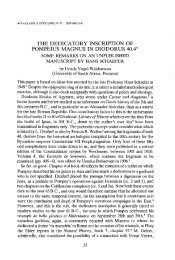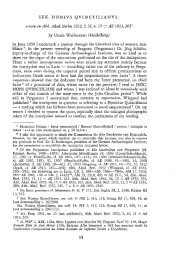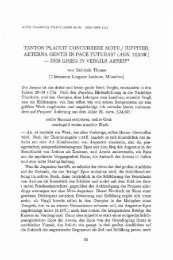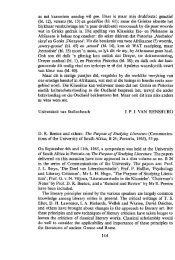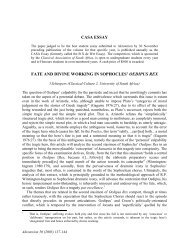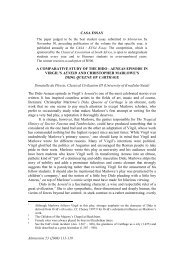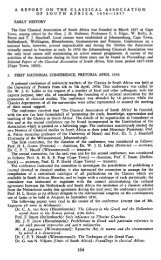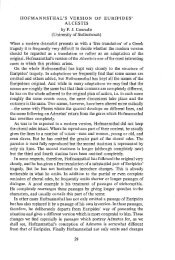FORTUNA IN AMMIANUS MARCELLINUS by C. P. T. Naude ...
FORTUNA IN AMMIANUS MARCELLINUS by C. P. T. Naude ...
FORTUNA IN AMMIANUS MARCELLINUS by C. P. T. Naude ...
Create successful ePaper yourself
Turn your PDF publications into a flip-book with our unique Google optimized e-Paper software.
with what may be regarded as the Roman outlook. 30 It involved him in the<br />
inconsistency of denying the role of tyche which in his introduction he had<br />
virtually proclaimed the theme of his history. 31 The outcome is a dualism<br />
in Polybian pragmatism consisting in the attribution of Roman success to<br />
character, training and the excellence of political institutions-and simultaneously<br />
to the overriding power of a tyche which comes close to 'providence'.32<br />
This dualism underlies a much discussed passage in Cicero's De republica<br />
which is based on Polybius. 33 It occurs in a patriotic context in which Cicero<br />
expresses admiration for the genuinis domesticis virtutibus over against<br />
the importatis artibus, 34 and is evident approval of what Cicero may have<br />
regarded as the 'Romanism' of Polybius in rejectingfortuna-tyche. 35 At the<br />
same time the concluding phrase nee tamen adversante fortuna includes<br />
vague acknowledgement of the teleological tyche, the second element in the<br />
pragmatism of Polybius. 36 This dualism may have given rise to the myth<br />
in Plutarch, followed <strong>by</strong> Florus and Ammianus, of a positive and friendly<br />
alliance between arete and fortuna-tyche to accomplish Rome's greatness. 37<br />
It is a theme which conflicts with the traditional Roman idea; 38 but it<br />
30. Polyb. 1.63.9:
ought a solution to the conflict in the Greek mind in regard to tyche<br />
and arete and the greatness of Rome as to rco-rspac; ysyovsv spyov. 39<br />
Fortuna, with whom tyche came to be identified, 40 occurs in Roman historiography<br />
with all the traditional features of tyche. She is not initially<br />
Roman, but entered Rome fairly late as part of the religious mood of the<br />
revolution 41 and at a time when the growing influence of Greek philosophical<br />
thought hastened the disintegration of the state religion, unwittingly<br />
preparing the way for her domination. 42 By the time of the elder Pliny<br />
fortuna had become at Rome precisely what tyche had been for Hellenistic<br />
Greece. Her essential qualities were fickleness, blindness, and the favouring<br />
of the unjust. 43 She was unfriendly, and her favours brought infatuation. 44<br />
She became a reality in the outlook of the Roman as tyche was for the<br />
Greek, 45 and influences his interpretation of history. But the Roman<br />
attitude remained one of opposition and resistance: 'Die romische Moral<br />
umfasst durchaus die Uberzeugung, mann konne durch tapferes und tatiges<br />
Verhalten Einfluss auf das Schicksal nehmen'. 46 Setbacks were caused <strong>by</strong><br />
fortuna, but recovery was due to virtus. 47 The factor which brought about the<br />
greatness of Rome may be summed up in the term virtus Roman a. 48 Cannae<br />
was the classical exemplwn of the working of a malicious fortuna, and of<br />
Rome's resistance and recovery. 49 In the outlook of the Roman virtus was<br />
superior to fortuna, and it contradicts the usual Hellenistic view which<br />
looked upon tyche as holding unlimited sway. 50 In certain cases fortuna<br />
39. Plut., o.c., 316c; cf. Ri:isiger, p. 14 n. 29.<br />
40. Herzog-Hauser, 'Tyche und Fortuna', Wien. Stud. 53 (1948) p. 156; R . A. Pack,<br />
Tyche, O.C.D. p. 930.<br />
41. Jaeger, 443 ff.<br />
42. P. G . Walsh, Livy-his historical aims and methods, Cambridge 1961, 55 f.; cf. W.<br />
Fowler, Encycl. of Ref. and Etlz., ed. <strong>by</strong> J. Hastings, 6, Edinburgh 1913, p. 99: 'There is<br />
thus in the early history of the worship of Fortuna nothing to suggest that the virile and<br />
persistent Roman ever believed himself or his state to be at the mercy of chance', quoted<br />
<strong>by</strong> Gerda Busch, 'Fortunae resistere in der Moral des Philosophen Seneca', Ant. u.<br />
Abend/. 10 (1961) p. 135, a valuable article with exhaustive documentation.<br />
43. Plin. N.H. 2.22: volubilis .. . et caeca ... vaga, inconstans, incerta, varia indignorumque<br />
fautrix; Cic. Mil. 69: vaga volubilisque fortuna .<br />
44. Cf. Cic. Amic. 54 : non enim so !ton ipsa fortuna caeca est, sed eos etiam p/erumque<br />
efficit caecos, quos complexa est; cf. Liv. 4.13.4, for infatuation caused; Kajanto, p. 84.<br />
For her saevitia cf. Liv. 25.38.10, Sail. Cat. 10.1; Erkell, p. 153; Kajanto, p. 91.<br />
45. Plin. N.H. 2.22: omnibus vacibus fortuna sola invocatur ; Walsh, 55 ff. ; Kajanto,<br />
80 f., contra Erkell, p. 155 and 157 (Sallust), p. 164 and 166: 'nur ein stilistischer Schmuck',<br />
and p. 173: 'ein absichtlich verwendetes literarisches Motiv' (Liyy).<br />
46. Gerda Busch, p. 135; cf. n. 38 above.<br />
47. Liv. 3.58.4; Livy wants to convey the impression that during the darkest hours of<br />
the Hannibalic war malicious fortuna wanted to annihilate the Romans; cf. 23.22.1 and<br />
25.38.10; Kajanto, p. 82. See also Dion. Ant. Rom. 2.17.3-4.<br />
48. Kajanto, p. 34; cf. p. 62 with reference to Liv. 26.41.9.<br />
49. Liv. 22.16.13-15, 22.54.10-11, 25.38.10: cuius populi vis ac virtus non obruta sit<br />
Cannensi clade, ex omni profecto saevitiafortunae emersurum esse; cf. Dion., l.c. inn. 47.<br />
50. E.g. Curt. 3.8.39; cf. Kajanto, p. 92.<br />
75
Ammianus uses fortuna in a variety of senses. 59 An attempt to find unity<br />
in his thinking on the subject offortuna-tyche or to find an indication of the<br />
basic meaning he attaches to its role in history will have to take into account<br />
Ammianus' affinity with Roman historiography, and the ideas it transmits,<br />
as well as his religious beliefs considered within the context of his times.<br />
The Roman element in Ammianus has recently been the theme of a separate<br />
article, 60 while attention was drawn <strong>by</strong> Ensslin to the influences emanating<br />
from the circle of Symmachus-its insistence on old time Roman virtus<br />
and gravitas, and its interest in authors such as Cicero and Vergil. 61 Cicero<br />
was an author greatly admired <strong>by</strong> Ammianus. 62 But Ammianus' affinity<br />
with Roman historiography cannot be asserted without qualification. There<br />
are formal aspects of his historiography which are Greek, such as his long<br />
geographical digressions. 63 Similarly the digressions on Rome bear affinities<br />
with epideictic Greek literature, i.e. with the encomium or invective as a<br />
genre. 64 In his aim to write imperial history Ammianus is closer in his<br />
breadth of vision to writers of universal history, and, among Latin writers,<br />
to Trogus, than to the traditional Roman historian. 65 On the other hand the<br />
central place occupied <strong>by</strong> Rome as the proclaimed mistress of the empire<br />
59. Cf. Ensslin, 69 ff.<br />
60. H. Trankle, 'Ammianus Marcellinus als romischer Geschichtsschreiber', Ant. u.<br />
Abend/. 11 (1962) 21 ff.<br />
61. Ensslin, p. 7 and 62 ;· cf. Triinkle, p. 26. At the proof stage I received the study of<br />
A. Cameron, 'The Roman friends of Amrnianus',JRS 54 (1964) 15 ff., who re-examines<br />
Ensslin's widely accepted views.<br />
62. Philological studies establishing Ammianus' acquaintance with Latin authors include<br />
M. Hertz, De A .M. studiis Sallustianis, Ind. Schol. Breslau 1874; id. '.A. Gellius und<br />
A.M.', Hermes 8 (1874) 257 if.; H. Michael, De A.M. studiis Ciceronianis, Diss. Breslau<br />
1874; H. Wirz, 'Ammians Beziehungen zu seinen Vorbildern Cicero, Sallustius, Livius,<br />
Tacitus', Philo/. 36 {1877) 627 ff.; E. Schneider, Quaestiones Ammicmeae, Diss. Berlin<br />
1879 (Val. Maximus and Herodian); S. Weinstein, Quibus in rebus Ammianus Sallustium<br />
et Tacitum respexerit, Progr. Raduatz 1914; H. Hagendahl, Studia Ammianea, Diss.<br />
Uppsala 1921.<br />
63. Amm. 14.8.1-14, 22.15.1-16.24, 22.8.1-48, 23.6.1-88, 27.4.1-14, 15.9.1-12.6; cf.<br />
14.7.21, 25.5.18 and 27.8.4, reference to digressions in the lost portion of his work.<br />
Ammianus was regai:ded as a Greek historian writing in Latin <strong>by</strong> U. Wilamowitz, in<br />
Teubners Kultur der Gegenwart, Leipzig 1912, p. 277 and 470, and <strong>by</strong> F. Leo, Die griechisclzriimische<br />
Biographie, Leipzig 1901, p. 269.<br />
64. Roger Pack, 'The Roman Digressions of Amrnianus Marcellinus', TAPA 84 (1953),<br />
181 ff.<br />
65. Max Budinger, 'Ammianus Marcellinus und die Eigenart seines Geschichtswerkes,<br />
eine universalllistorische Studie', Denkschr. Wien. Akad. d. Wiss., Phil. Hist. Kl. 24<br />
(1896); cf. E. A. Thompson, The Historical Work of Ammianus Marcellinus, Cambridge<br />
1947, 126 f., Ammianus in breadth of view contrasted to Tacitus; Otto See!, Die Prae.fatio<br />
des Pompeius Tragus, Erlangen 1955, 82 f., the Roman historian's 'unbegreifliche Einengung<br />
des geschichtlichen Blickfeldes: allein auf Rom'; Trogus on the other hand writes<br />
'nicht romische, sondern universale, also imperiale Geschichte'. See also my Leyden<br />
dissertation, p. 123, with reference to the geographical digressions. See also A. D. E.<br />
Cameron, 'Literary allusions in the Historia Augusta', Hermes 92 (1964) 375 f., on Amrniani.Js<br />
and Trogus.<br />
77
in Ammianus as well as in Trogus is Roman. 66 The Roman element is<br />
unmistakable in Ammianus' encomium on Rome. 67 Roman too is the conception<br />
of history as consisting in exempla, 68 particularly as consisting in<br />
'examples' of right and wrong behaviour. 69 In this Cicero influenced him<br />
most. 70 This is in harmony with the characteristic moral tendency of<br />
Ammianus' historiography much of which is basically Roman. 71<br />
Of all the various occurrences of fortuna in Ammianus the majority concerns<br />
the ficklefortuna-tyche associated in origin with the Hellenistic period.<br />
There are, however, also other clearly definable usages. Many instances<br />
are ambiguous, some with a tendency to merge into fortuna of another<br />
kind. The problem of establishing identity and arriving at Ammianus'<br />
personal beliefs and its relevance for his historiography is accentuated <strong>by</strong><br />
the use of metaphor or literary conventions; these depend for their stylistic<br />
effect on some form of personification of fortuna. Striking and well-known<br />
metaphors are employed in connection with fortuna-tyche in Ammianus,<br />
all of which with the object of accentuating her personality and character,<br />
such as the image of the 'breeze of fortune', fortunae saevientis procellae, 72<br />
or of fortune's winged wheel,fortunae volucris rota, 73 interchanging adversity<br />
and prosperity. The metaphorical intention is sometimes indicated <strong>by</strong><br />
quodammodo, quaedam, velut or quasi. Julian in his success is described as<br />
being borne 'in some way or another' on the shoulders of fortune, ut ipsis<br />
66. Amm. 14.6.6 :per omnes tamen quot orae sunt partesque terrarum, ut domina suscipitur<br />
et regina; 17.4.13: templwn mwzdi totius; 16.10.13: imperii virtutumque omnium lares;<br />
19.10.4: <strong>by</strong> the will of heaven, divini arbitrio numinis, quod auxit ab incunabulis Romam,<br />
perpetuamque fore spopondit. Similarly for Trogus fate brought all the threads of history<br />
together at one point, namely Rome; See!, 81 f. See also L. Dautremer, Ammien Marcel/in,<br />
Etude d'histoire litteraire, Lille 1899, 39 ff., and p. 141 with reference to 25 .10.5.<br />
67. Amm. 14.6.3-6; imitating Florus 1.1.4-8; cf. Lindenbr. and Valesius, ed. Wagner<br />
Erfurdt, 1808; see also de Jonge.<br />
68. Amm. 30.4.2: nul!is vetustatis lectionibus expolitum, of Valens, in conjunction with<br />
30.8.2 ff. of Valentinianus: potuit exempla multa contueri maiorum, et imitari peregrina<br />
et interna humanitatis et pietatis; Julian, in contrast, was antiquitatum peritus, 23 .5.21.<br />
Cf. 30.8.9 for the object to find in examples virtutis indicia; 27.6.14 for aemulanda bonae<br />
fiduciae exempla; 27.3.3, for the elder Symmachus as being inter praecipua nominandus<br />
exempla doctrinarum et modestiae. See Dautremer, p. 49; Triinkle, 23 f.; M. L. W.<br />
Laistner, The Greater Roman Historians, Univ. Calif. Press 1947, p. 147; and my Leyden<br />
dissertation 81 ff.<br />
69. Amm. 14.6.10-11, 16.10.3, 21.16.13-14, 30.8.4-6; and Triinkle, p. 26.<br />
70. Cic. De leg. 1.4 ff.: the aim of history is clarorum virorum facta moresque posteris<br />
tradere. Ammianus regarded Cicero among orators as excellentissimus omnium, 30.4.7.<br />
Michael o.c. n. 62; Triinkle, 24 ff.; Poschl, Riimischer Staat, p. 80 and 104.<br />
71. Dautremer, p. 60: 'Continuant Ia tradition des grands historiens romains, il pense<br />
que l'histoire do it etre une ecole de morale'; also 38 f. and 160 ff.; Ensslin, 42 ff. on<br />
Ammianus' 'Sittlichkeitsideal'; Triinkle, 27 ff.<br />
72. 14.1.1 ; cf. 23.5.8: incerto flatu fortunae; 19.6.1: adspiravit auram quandam salutis<br />
fortuna. Cf. also SHA 23.5.6: saevientefortuna; and in the last resort Cic. De off 2.19.20:<br />
magnam vim esse in fortuna in utramque part em, vel secundas ad res vel adversas . . . cum<br />
prospero flatu eius utimur, ad exitus pervehimur optatos, et, cum reflavit, aff!igimur.<br />
73. 31.1.1; cf. 26.8.13.<br />
78
quodammodo cervicibus fortunae ... evectus; 74 and he is elated at the good<br />
things bestowed <strong>by</strong> fortune 'as if' bearing an earthly horn of plenty, velut<br />
mundanam cornucopiam fortuna gestans propitia. 75 His followers when<br />
ordered to the East complained that a fortuna quaedam inclemens was<br />
depriving them of a mild ruler. 76 Probus was borne on the swift wings 'as it<br />
were' of a 'kind of' congenital good fortune: hunc quasi genuina quae dam ...<br />
fortuna vehens praepetibus pinnis. 77 These metaphors have to be studied in<br />
relation with other evidence to arrive at their true significance for Ammianus.<br />
In a number of instances fortuna is but vaguely personal, as when Constantine<br />
sets out ductu laetioris fortunae, 78 or when Theodosius determined<br />
to punish the Franks and Saxons si copiam dedisset fortuna prosperior. 79<br />
These occur in a military context ;fortuna is generally favourable and means<br />
'luck' . 8° Kajanto classifies similar occurrences, though not all of them, in<br />
Livy as impersonal. 81 In Ammianus 'luck' tends to be personalised; it is<br />
a soldier's belief or habit of mind, also on the part of Ammianus himself,<br />
whether in an unreflective mood or to reveal his aptitude to write history<br />
ut miles quondam. 82 This soldier's belief is more clearly revealed in occur-<br />
. rences which are part of what somebody says, as when the standard-bearer<br />
urges Julian: perge ... Caesar, quo te fortuna prosperior ducit. 83 It tends to<br />
merge into the personal fortuna, which is however distinguished <strong>by</strong> eius<br />
or clearer indication of personal relationship. 84 On the other hand fortuna<br />
in an unfavourable sense, fortunae dispendia tristioris, points towards<br />
fortuna-tyche. 85<br />
In a number of instances fortuna in Ammianus is used as a metaphor for<br />
a condition of life or a state of affairs. In these instances fortuna has a<br />
passive sense and is impersonal. A crowd 'of every condition', magna<br />
promiscuae fortunae multitudo, is said to have gathered for the fair at<br />
Batne ; 86 Zizais is described as suited for the honours of a 'distinguished<br />
position', conspicuae fortunae insignibus aptum; 87 a sententia of Cicero is<br />
quoted to the effect that fortuna restored ex miseris ... rebus ad meliorem<br />
74. 25.4.14.<br />
75. 22.9.1. This is the Horn of Amalthea, Ov. Me tam. 9.87 f.; cf. Valesius, Wagner<br />
Erfurdt: 'fortuna eo habitu fingi solebat, dextra gubernaculum, cornu Amaltheae sinistra<br />
gestans'.<br />
76. 20.4.13; cf. 25.5.8: caeco quodam iudicio fortunae; 19.6.1: auram quandam.<br />
77. 27.11.2. 78. 17.12.4. 79. 27.8.6. 80. Cf. 26.7.15.<br />
81. Liv. 3.8.11; Kajanto, p. 76.<br />
82. 31.16.9; cf. my study, 'Battles and Sieges in Ammianus Marcellinus', Acta Class.<br />
1 (1958) 92 ff.<br />
83. 16.12.18; 21.5.5: si fortuna coeptis adfuerit.<br />
84. Cf. Liv. 29.26.5: suapte fortuna, of Scipio; 25.24.13: fortuna sua, of Hiero; likewise<br />
35.42.8, of Hannibal; Kajanto, p. 72.<br />
85. 29.6.15; cf. Kajanto, p. 64, who however includes 'luck' in this tendency.<br />
86. 14.3.3: cf. Kajanto, p. 73: the passive sense is clearer when it is not qualified <strong>by</strong> a<br />
possessive. However cf. 18.8.6 below.<br />
87. 17.12.20.<br />
79
Greek. Tyche as a protectress of city-states and rulers was a phenomenon<br />
of the Hellenistic period. 99 The personal fortuna, the Roman version of it,<br />
became a more frequent occurrence in Roman than the personal tyche had<br />
been in Greek literature and historiography. The most important form of<br />
the personal fortuna in Livy is the fortuna populi Romani, which occurs more<br />
commonly in the first decad. 100 Livy was influenced <strong>by</strong> Cicero, who also<br />
speaks of the rei publicae fortuna. 101 It is not found in Roman cult, and the<br />
earlier view that it was a native Italian 'Gliicksgottin' is no longer held. 102<br />
A feature of the fortuna populi Romani is the frequency of its occurrence<br />
along with virtus which it supplements, particularly in critical situations. 103<br />
But sometimes it works against the Roman people. 104 Under the Empire<br />
the tyche or fortuna of emperor and cities tended to become assimilated to<br />
their genius. 105<br />
In his references to the personal fortuna Ammianus not only reveals his<br />
own beliefs but also the beliefs of his contemporaries. This fortuna was not<br />
wilful but was associated with pre-eminent merit, and the idea was firmly<br />
established that all emperors had their fortuna, though the fortuna of a bad<br />
emperor may eventually forsake him. 106 It was the general belief that<br />
Constantius' fortuna only watched over him in civil troubles, for tun am eius<br />
in malis tantum civilibus vigilasse. 107 It was also common knowledge that<br />
Theodosius' fortuna was propitious and faithful: cum aperte constaret nulla<br />
eius propitiam deseruisse fortunam. 108 In his case it goes hand in hand with<br />
99. Nilsson, 195 ff.; Herzog-Hauser, Tyche, RE, col. 1665 ff.; Kajanto, 14 f. and 64 ff.<br />
100. Liv. 1.46.5, 2.40.13, 3.7.1, 6.30.6; Kajanto, p. 65 and 70.<br />
101. Cic. Leg. Man. 45: fortuna populi Romani; Phil. 5.29: fortuna quaedam rei publicae<br />
excluded Antony from the state; Kajanto, p. 67.<br />
102. G. Wissowa, Religion und Kultus der Romer, Mi.inchen 1912, p. 261 f.; cf. Ensslin,<br />
p. 71. However Kajanto, p. 67: 'a mere hypothesis'. But seeR. A. Pack, Tyche, O.C.D.,<br />
p. 930, and also n. 120 below.<br />
103. Liv. 6.30.6, 35.6.8-10; Kajanto, p. 68, and for his criticism of Erkell's theory, see<br />
p. 69, and also Ovid's conception of Fate, Turku 1961, 26 f.: 'Personal fortuna certainly is a<br />
sort of guardian spirit'. Erkel!, 176 ff., put forward the view that the fortuna of a place or a<br />
person refers to the 'Gli.ickskraft' they possess, to their omen for the future in the light of<br />
past events associated with them: 'Wer einen Erfolg erzielt hat, hat dadurch berechtigte<br />
Hciffnungen auf mehr Erfolg, wei! Ereignisse sich gern wiederholen; omnia principiis<br />
inesse solen!'; p. 179. In Ammianus see instances of a dux fortunatus, n. 110 below, who<br />
may be said to possess 'Gli.ickskraft'.<br />
104. Cic. Mil. 87: dura ... fortuna populi Romani et crude/is ... quae tot annos ilium<br />
(sc. Clodiwn) in hanc rem publicam insultare pateretur.<br />
105. Nilsson, p. 199; Hertwg-Hauser, RE, col. 1664; cf. Valesius on Am. 30.5.18.<br />
106. 21.14.2, Constantius; 30.5.18, Valentinian, not however altogether bad but alia<br />
commodissimus, 29.3.9.<br />
107. 14.10.16; cf. 14.11.8, and Eutr. 10.5: cuius in civilibus be/lis magis quam in externis<br />
bel/is sit laudandafortuna, Lindenbr., Wagner-Erfurdt.<br />
108. 28.3.7.<br />
81
outstanding generalship. 109 Emperors too believed in their own fortuna and<br />
were easily flattered; adulatoribus in maius fortunam principis (sc. Valentis)<br />
extollentibus. 110 In some or most instances their fortuna is eventually assimilated<br />
to their genius,m sometimes in the form of a spectre which appears<br />
before them. Constantius believed he sometimes had a vision of his fortuna,<br />
secretum aliquid videre ... quod interdum adfuisse sibi ... aestimabat, which<br />
was currently believed to have been his genius: putabatur genius esse quidam,<br />
tutelae salutis appositus. 112 Valentinian had a vision of his fortuna the night<br />
before he died; it was in the form of his wife in mourning attire, quam<br />
aestimari dabatur fortunam eius esse, cum taetro · habitu discessuram. 113<br />
Ammianus' personal belief is revealed in the way he reports those instances,<br />
cum aperte constaret, or quam aestimari dabatur, and also <strong>by</strong> his association<br />
of fortuna with an emperor's protective genius, 114 which is followed in the<br />
case of Constantius <strong>by</strong> a digression onfamiliares genii. 115 Visions were also<br />
reported, of a different kind but with evident belief, as omens foreshadowing<br />
the death of Valens. 116<br />
The fortuna populi Romani does not occur in Ammianus, but once only<br />
the fortuna orb is Romani is named and censured for transferring at a critical<br />
moment the reins from Julian's experienced hands to the hands of the<br />
inexperienced Jovian who betrayed Nisibis: tu hoc loco (fortuna orbis<br />
Romani) merito incusaris, quae, difflantibus procellis rem publicam, excussa<br />
109. 28.3.6: niilitari scientia ... superabat praesentes; cf. 28.3.1 : dux nominis incluti.<br />
This is a case of a great man and his inseparablefortwia; Kajanto, p. 72; cf. Liv. 29.26.5,<br />
Scipio; also Am. 23.5.20: dux inclytus used of Scipio Aemilianus; Valesius, Wagner<br />
Erfurdt, and Brok. See also 15.8.2, virtus and fortuna associated, and n. 137 below.<br />
110. 31.4.4; cf. Constantius' flatterers, 15.8.2: nihil esse ita asperum dictitantes, quod<br />
praepotens eius virtus, fortunaque tam vicina sideribus, non superaret; also effective with<br />
Sapor, 18.5.8: regem incendebat ut . .. anna fretus fortunae suae magnitudine concitaret.<br />
In this category probably also falls 16.12.18: perge f elicissime ... Caesar (sc. Iulianus),<br />
quo te fortuna prosperior ducit, in conjunction with 16.12.13: fortunati rectoris expertis<br />
virtutibus freti, with reference to Julian's fortuna, a salutaris quidam genius praesens; and<br />
correlate also 21.5.9: magnum elatumque ducem, et (ut experta est) fortunatum domitorem<br />
gentium. Note the association of fortuna and virtus, also in the minds of Constantius'<br />
flatterers.<br />
111. Cf. 16.12.13, Julian.<br />
112. 21.14.2. Wagner, Wagner-Erfurdt, identifies this with Constantius' fortuna<br />
haerens et subsist ens, 21.14.1, 'quam praeter communem illam rerum humanarum moderatricem<br />
suam cuique homini tribuere solebant, quaeque eadem est cum genio'. See also<br />
Brok on 25.2.3.<br />
113. 30.5.18; cf. Lindenbr., Wagner-Erfurdt.<br />
114. 21.14.2, Constantius; 30.5.18, Valentinian; generally 'beim nahenden Todesgeschick<br />
eines Kaisers', Ensslin, p. 71. Cf. Julian, and Valens, though visions of a different<br />
kind; n. 116 below.<br />
115. 21.14.3 ff. Ensslin, 63 ff., regards this as evidence of the 'altromisch gefiirbten<br />
Neuplatonismus' (p. 62) and its influence on the Nicomachus-Symmachus circle. See also<br />
n. 144 below on Adrastia and Nemesis.<br />
116. 25.2.3, 31.1.3.<br />
82
egimenta perito rei gerendae ductori, consummando iuveni porrexisti.l1 7 The<br />
substitution of orbis Romani for populi Romani reveals the universal historian<br />
in Ammianus, as compared to Livy, just as the far more frequent occurrence<br />
of the personal fortuna reflects the importance under the later Empire of<br />
the fortunes of the emperor: the populus Romanus, declining into old age<br />
and nomine solo aliquotiens vincens had <strong>by</strong> now entrusted the management<br />
of its affairs to the Caesars. 118 Two references to the genius publicus occur,<br />
observed in a vision <strong>by</strong> Julian on two occasions. 119 They appear to be quite<br />
distinct from the fortuna orbis Romani and belong in the context of contemporary<br />
belief. 120 The addressing on the other hand of the fortuna orbis<br />
Romani on this occasion bears testimony to Ammianus' intense Romanism<br />
as is borne out <strong>by</strong> the historical digression and the exempla immediately<br />
following, in which he finds compensation. 121<br />
By far the most common occurrences in Ammianus are of fortuna personified<br />
as the hostile and unpredictable power in the history of states and<br />
the lives of men. She is an historical force of which the historian takes note,<br />
an arbitress of human affairs, fortuna moderatrix humanorum casuum 122 or<br />
rerum domina,1 23 constantly active in situations all and sundry,l 24 and recognisable<br />
in her traditional features. She is fickle and variable, inconstans,<br />
versabilis, mutabilis,l 25 and her inconstancy is emphasised <strong>by</strong> creating her<br />
in the image of a breeze. 126 She is basically hostile and unfeeling-'harsh',<br />
'adverse', 'unjust', 'merciless and blind', 'cruel and oppressive'. 127 She<br />
upsets men's lives, and she strikes swiftly and unexpectedly with the turning<br />
of her wheel.1 28<br />
To all appearances her operations are unjust. The weak and the cowardly<br />
are victorious over eminent men through the mutability of fortuna, or the<br />
117. 25.9.7. But note SHA 12.13.6, a reference to fortuna rei publicae.<br />
118. 14.6.4-5.<br />
119. 20.5.10, with his elevation to Augustan dignity; 25.2.3, just before he was mortally<br />
wounded, velata capite ... tristius discedentem.<br />
120. Cf. the geniifamiliares, 21.14.2; Enssiin, p. 63 and n. 102 above; see Brok on 25.2.3,<br />
also correlating Liv. 21.62.9.<br />
121. 25.9.8 If.; cf. Enssiin, p. 31 : 'vielmehr sucht er sich Trost aus der Geschichte des<br />
Romervolkes'. The censuring of fortuna is an existing motif, cf. Polyb. 15.20.5 (fortuna-tyche):<br />
ou J.lftV &J...'J.<br />
... a tic; ouK: iiv e!K6troc; t'ij tUX.lJ J.lEJ.liVCLJ.lEVO
The history of Constantius follows a similar pattern. Infatuated <strong>by</strong> successes<br />
which he did not deserve, he prided himself wrongfully on his<br />
felicitas. 137 After the fall of Silvanus he behaved insolently, became puffed<br />
up <strong>by</strong> the magniloquentia adulatorum and arrogated to himself too great a<br />
rule for a mortal.1 38 The rebellion and fate of Silvanus form part of this<br />
larger theme. Silvanus' death, accomplished <strong>by</strong> fortuna eventu celeri 139 is<br />
a wrong inflicted upon a victim of integrity and merit, 140 but underlying itand<br />
Ursicinus' share in it 141 -is the story of justice revealed in Constantius'<br />
ultimate end.14 2<br />
One great problem in studying fortuna-tyche in Ammianus is to decide<br />
its relation to Adrastia and Ammianus' belief in the all-controlling factor<br />
of justice. Ensslin has shown that Ammianus can with good reason be<br />
regarded as a determinist, 143 and concludes: 'Eine Fortuna als indignorum<br />
[autrix, wie bei Plinius, hat doch schlechterdings bei Ammian keinen Platz<br />
mehr neben der von ihm eingefiihrten Adrastia-Nemesis, als einem ius<br />
quoddam sublime numinis efficacis, und neben der substantia/is tutela generali<br />
potentia partilibus praesidens fatis, die er selbst als Tochter der Iustitia<br />
137. 15.5.35: insolentia coalitus et tumore, hoc quoque felicitatis suae prosperis cursibus<br />
assignabat, eo more quo semper oderat f01·titer facientes; 'hoc quoque' with reference to<br />
14.10.15, adlapsa felicitate. For the link between personal fortuna andfelicitas, see 21.16.13,<br />
quoting Cicero: felicitas est fortuna adiutrix bonorum, also Cic. Manil. 47, in connection<br />
with the felicitas of Pompei us: fuit . . . quibusdam summis viris quaedam . . . ad g/oriam<br />
et ad res magnas bene gerendas divinitus adiunctafortuna; so too Julian, 25.4.14 along with<br />
25.4.10 ff., fe!icitas in conjunction with outstanding achievements. See also H . Wagenvoort,<br />
Roman Dynamism, Oxford 1947, p. 61, with reference to Cic. imp. Cn. Pomp. 28.<br />
But Constantius' fortuna aided him malis tantum civilibus, n. 107 above; and therefore he<br />
did not know true felicitas, 21.16.13: ergo in perditis impiisque consiliis, quibus Caesar<br />
usus est, nulla potu it esse felicitas. For the correct attitude, Cic. I.e.: de felicitate ... sicut<br />
aequwn est homines de potestate deorum, timide ... dicamus; cf. Erkell, p. 45, and p. 53:<br />
'einer Art von "gottlichem Segen" '.<br />
138. 15.5.37: ut iam caelo contiguus, casibusque imperaturus humanis, magniloquentia<br />
su.fflabatur adulatorum, with reference to Croesus; 17.12.17, the opinion of his contemporaries:<br />
fatum vinci principis potestate vel fieri. Cf. Procopius, 26.8.13: ultra homines<br />
sese efferens, et ignorans quod quivis beatus, versa rota fortunae, ante vesperum potest esse<br />
miserrimus.<br />
139. 15.5.1, along with 1.5.31; cf. de Jonge.<br />
140. 15.5.32: dux haut exsilium meritorum.<br />
141. 15.5.36, Ursicinus was not rewarded for his industrie gesta; cf. 16.12.69, and<br />
Thompson, p. 55. This might alleviate from a purely historiographical point of view this<br />
'sordid story'; see Thompson p. 45, and W. den Boer, 'The Emperor Silvanus and his<br />
army', Acta Class. 3 (1960) p. 105: 'the vile treachery ofUrsicinus'.<br />
142. 21.14.1 f., in conjunction with 21.16.13.<br />
143. Ensslin, p. 75, with reference to 25.3.17: tallletsi prosperitas ... utilitasque consulforum<br />
non ubique concordent, quoniam coeptorum eventus superae sibi vindicant potestates;<br />
but with due allowance for Willensfreilieit (p. 74); cf. 17.8.2 and 21.1.1: 'Da spricht der<br />
alte Soldat aus Arnmian'.<br />
85
vetustas, the key to endurance and recovery from disaster ; 151 and on this<br />
gloria depended, man's survival with posterity. 152<br />
In their struggle with fortuna there were times when the Romans temporarily<br />
yielded in spirit: bellorum iniquitati cesserunt ad tempus. 153 The<br />
occasions on which this occurred are described in a digression on exempla<br />
which illustrate Roman recovery after disasters 154 that had occurred at<br />
various times in the past, 155 and which are associated with the operations<br />
of fortuna: aliquotietzs reflante fortuna fallaciis lusi. 156 That these disasters<br />
were due to her operations and that resistance is part of the theme is also<br />
borne out <strong>by</strong> the general context, a series of more recent events attributed<br />
to fortuna which culminated in Adrianople. 157 The function of the digression<br />
is to impart historical perspective for the benefit of the antiquitatum ignari<br />
who were depressed <strong>by</strong> set-backs and who did not realise that their forbears<br />
succeeded in recovering when similarly afflicted. 158 For ignorance is deceptive<br />
and in this do fallaciae consist which make men lose heart. 159 In the context<br />
151. 31.5.14; 31.10.19 : magna sobrietas consiliorum of Antoninus, needful for overcoming<br />
disaster; 15.4.3: vetus illa Romana virtus et sobria, and cf. Valesius, Wagner<br />
Erfurdt, with reference to Hegesippus: 'ille praestantissimus, qui inter adversa sobrius<br />
colluctatur casibus'; cf. Dautremer, p. 44, for all the qualities comprehended under<br />
sobrius; also Ensslin, p. 45: 'dem alten Ri:imerstolze ... fi.ir den virtus et sobrietas Leitmotive<br />
waren', alsop. 46; and Trankle, p. 27. Sometimes sobrietas implies balance and<br />
stability through learnedness and knowledge of history, e.g. 16.7.5-6, Eutherius was<br />
eruditus as well as semper sobrius et in primis consistens; 21.10.6, Aurelius Victor, the<br />
historian, virum sobrietatis gratia aemulandum; cf. Julian, 23.5.21: antiquitatum peritus,<br />
and also sobrius, 17.3.1 and 22.7.9. See also 14.6.15: homines eruditos et sobrios.<br />
152. 14.6.8, for Cato conscientia lzonesta recteque factorum was the path to vera gloria,<br />
not extravagance; cf. Polyb. 31.25.5a; to this on the other band Ampelius failed to attain,<br />
flexus in molliora (amisit) gloriam diu victuram, 28.4.3. ·<br />
153. 31.13.19. .<br />
154. 31.5.11-16: the invasions of the Teutones and Cimbri; upheavals in the time of<br />
Marcus Aurelius; Scythian peoples eventually driven out <strong>by</strong> Aurelianpost clades acceptas<br />
il/atasque multas et saevas.<br />
155. 31.5.11 : superiores vel recens praeteritae . .. aetates.<br />
156. 31.13.19: Ensslin interprets this as Rome's personal fortuna; cf. 25.9.7. But see<br />
Cic. De off. 2.6.19: cum reflavit (sc. fortuna), af!ligimur, with referecne to interitus exercituum<br />
... clades imperatorum ... civium expulsiones, calamitates, fugae. This forms part<br />
of the resistance theme, cf. 38 above.<br />
157. 31.1.1: fortunae volucris rota, adversa prosperis semper alternans, Bellonam . ..<br />
armabat, maestosque transtulit ad Orientem eventus, followed <strong>by</strong> prodigies announcing<br />
the end of Valens at Adrianople, 31.1.2 in conjunction with 31.13.5.<br />
158. 31.5.11: negant antiquitatum ignari, tantis malorum tenebris offusam aliquando<br />
fuisse rem publicam . . . namque si superiores vel recens praeteritae revolvantur aetates, tales<br />
tamque tristes rerum motus saepe contigisse monstrabunt. From what immediately precedes<br />
we infer Ammianus had also Adrianople in mind, 31.5.10: lecturos ... obtestamur,<br />
nequis a nobis scrupu[ose gesta vel numerum exigat peremptorum, qui comprehendi nullo<br />
genere potuit, in conjunction with 31.13.10 ff.; cf. the uncertainty implied <strong>by</strong> illud tamen<br />
certum est (par. 17), and the general estimate without details: constatque vix tertiam<br />
evasisse exercitus partem (par. 18).<br />
159. 31.13.19: fallaciis lusi ... cesserunt ad tempus; cf. 31.5.11: antiquitatum ignari .•<br />
falluntur malorum recentium stupore confixi.<br />
87
of the digression too Ammianus underlines the role of old time virtus and<br />
sobrietas in the struggle withfortuna. 160 Lastly, the association of Adrianople<br />
with Cannae inevitably recalls the traditional theme of opposition and<br />
ultimate recovery. 1 61<br />
160. 31.5.12: quid potestas Martia adhibita prudentia valeat . .. didicere (sc. Teutones et<br />
Cimbri); 31.5.14: quod nondum solutioris vitae mollitie sobria vetustas infecta ... sed<br />
unanimanti ardore summi et infimi inter se congruentes, in conjunction with 14.6.10:<br />
nee ... gregariis militibus discrepantes (sc. maiores), of a time when it is said that men<br />
per bella saevissima ... opposita cuncta superasse virtute.<br />
161. Cf. note 49, above.<br />
88


